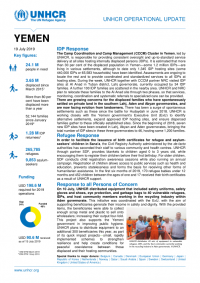Yemen: UNHCR Operational Update, 19 July 2019
Key figures:
24.1 M people in need
3.65 M displaced since March 2015
More than 80 per cent have been displaced more than a year
52,144 families since January 20192
1.28 M IDP returnees
265,785 refugees
9,853 asylumseekers
Funding
USD 198.6 M required for 2019 operations
USD 90.6 M received as of 15 July 2019
IDP Response
The Camp Coordination and Camp Management (CCCM) Cluster in Yemen, led by UNHCR, is responsible for providing consistent oversight and up-to-standard service delivery at all sites hosting internally displaced persons (IDPs). It is estimated that more than 30 per cent of the displaced population in Yemen—some 1.2 million IDPs—are living in various settlements, although to date only 1,345 IDP hosting sites (some 440,000 IDPs or 65,583 households) have been identified. Assessments are ongoing to locate the rest and to provide coordinated and standardized services to all IDPs at hosting sites. During the week, UNHCR together with CCCM partner NRC visited IDP sites at Al Anad in Tuban district, Lahj governorate, currently occupied by 34 IDP families. A further 100 IDP families are scattered in the nearby area. UNHCR and NRC plan to relocate these families to the Al Anad site through two phases, so that services, monitoring, coordination and systematic referrals to specialized care can be provided.
There are growing concerns for the displaced families who have spontaneously settled on private land in the southern Lahj, Aden and Abyan governorates, and are now facing eviction from landowners. There has been a surge of spontaneous settlements such as these since the battle for Hudaydah in June 2018. UNHCR is working closely with the Yemeni government’s Executive Unit (ExU) to identify alternative settlements, expand approved IDP hosting sites, and ensure dispersed families gather to these officially established sites. Since the beginning of 2018, seven new IDP sites have been created in Lahj, Abyan and Aden governorates, bringing the total number of IDP sites in these three governorates to 46, hosting some 1,200 families.
Refugee Response
In order to facilitate the issuance of birth certificates for refugee and asylumseekers’ children in Sana’a, the Civil Registry Authority administered by the de-facto authorities has seconded their staff to various community and health centres. UNHCR through partner SDF, provides blankets to children aged 0 to 3 years old, while encouraging them to register their children before their first birthday. For older children, SDF conducts child registration awareness sessions while also running an annual campaign. Registration of children allows access to public services such as health and education, prevents statelessness and forms the basis for receiving other forms of humanitarian assistance. In the first six months of 2019, 170 refugee babies under 12 months and 452 children between the ages of one and 17 received their birth certificates as a result of UNHCR support.
Response to all Persons of Concern
On 10 July, UNHCR distributed equipment that included safety uniforms, safety gloves and shoes, eye protection, and garbage bags to 40 vulnerable refugees, IDPs, and host community members working in the recycling industry within Aden governorate. This initiative was coordinated with the ExU, with the aim of supporting beneficiaries generate their income in safety and dignity. With the provided items, the beneficiaries were able to collect enough scrap metal and plastic to sell onto wholesalers; increasing their output four-fold. This project also supports the Yemeni government in improving public hygiene. UNHCR plans to distribute equipment to an additional 300 beneficiaries this year, as part of its quick impact projects—small, rapidly implemented schemes to strengthen resilience and help create conditions for peaceful coexistence between those displaced and their hosting communities.
https://reliefweb.int/report/yemen/yemen-unhcr-operational-update-19-july-2019


